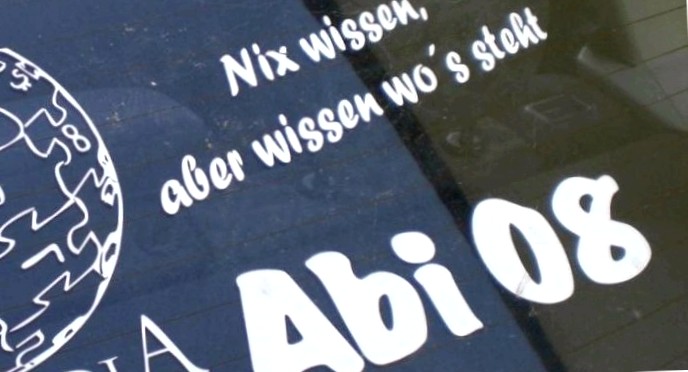Head of teachers’ association criticizes inflation of good school grades

Photo: lantus / CC BY-SA 3.0
Josef kraus argues that bavaria should use high school graduation grades from "undemanding federal states" no longer recognized
According to josef kraus, president of the german teachers’ association, good school grades are awarded all too easily in certain german states – he cites berlin as the main example. In berlin, the number of high school diplomas with an average grade of 1.0 has increased within ten years "fourteen times", he explained to the bild newspaper.
In the states of brandenburg, north rhine-westphalia and thuringia, too, there is a tendency for high school graduation grades to improve. Kraus speaks of "inflation" with school and abitur grades, which must come to an end, because report cards are not to "bad checks" should be allowed. His demand, which he follows up with, has it all:
Demanding states like bavaria should no longer recognize the high school diplomas of undemanding states.
Josef kraus, president of the german teachers’ association
From the abitur must again "become a certificate for study qualification and not for study entitlement", according to kraus. It is not the first tip of the former high school teacher from landshut and "education titans" (CSU minister of education ludwig spaenle) against the education policies of other states. Berlin is one of his favorite targets. The politicians there have driven the school system to the wall with reforms, kraus raged in the aftermath of the results of the IQB performance study in october of this year. Bavaria found itself at the top of the nationwide comparison of ninth-grade german and english proficiency, berlin at the bottom.
Arger about TIMSS and pisa
In the meantime, there have been two international comparisons, the TIMSS study of fourth grade elementary schools at the end of november and last week’s PISA comparison. In both studies, germany was good average. The fact that bavaria was unrecognizably in the good average obviously argues the president of the german teachers’ association. He found it very regrettable that the current TIMSS study "cannot be differentiated according to federal states". There had otherwise been "with certainty" highlighted a significant intra-german divide", said kraus.
The number of lessons alone that elementary school students enjoy varies greatly. An elementary school student in bavaria has in four years a little more than 4.100 hours of instruction, an elementary school student in berlin or brandenburg only about 3.700, a pupil in NRW 3.900. The difference corresponds to a half or. A quarter of a school year. It is not only the students who suffer, but also the secondary schools, which, especially in the subjects of german and mathematics, are often no longer able to ame in their initial classes what they were able to ame 25 years ago.
Josef kraus, president of the german teachers’ association
His attitude to pisa is ambivalent. On the one hand, in the past he has already interpreted it as a warning sign for a decline in level. This time, however, he criticized the fact that knowledge is only tested in a limited way or is only used to a limited extent. The numbers would say little, "education is considerably more", is kraus’ credo.
Pisa measured only a small section, and did not include, for example "linguistic expression, literary comprehension, foreign language skills, historical, geographic, economic, religious/ethical knowledge and aesthetic education". The narrowing of the social gap, the head start, which is particularly clear in bavaria as well, that students from better-off families have to overcome in order to succeed in school, is a major factor in the success of the school system, "educationally disadvantaged" kraus does not accept the idea of having a family. The school system in germany is highly differentiated, he says. There are no school dead ends:
About half of the students in germany do not obtain a university entrance qualification through the gymnasium or gymnasium branches of the school system. Among these 50 percent, children from so-called educationally deprived backgrounds are quite well represented.
Josef kraus, president of the german teachers’ association
Whether students who drop out of school and teachers who know their careers and backgrounds better agree with this remains an open question. Before the "inflation of A grades" kraus has been warning for a long time. The only figures he provides are those mentioned at the beginning of this article.
"Facilitation pedagogy"
According to a BR report from last year, his basic criticism is also aimed at the fact that children of helicopter parents do not learn enough hard lessons. "My concern is that children and adolescents – that often goes into the third, fourth decade of life – are given everything by their parents, that all obstacles are removed from their way.."
That this catching up is also behind his criticism of the "A grade inflation" shows his statement about "facilitation pedagogy". We have to trust the schoolchildren more again. "With this pedagogy of facilitation, one is only cheating oneself. That would be much more important than any place in a study."
Politically, the demand for non-recognition of a baccalaureate degree will turn out to be "not demanding federal states" hardly be implemented, but kraus says he is concerned with a debate uber bildungsinhalte.
He does not consider the pisa figures to be meaningful, because the proportion of migrants was not taken into account. One must orient oneself now again toward the internal german comparison: "we need to address the question: who can do better? The findings that things are better in countries such as thuringia, bavaria or baden-wurttemberg are there."